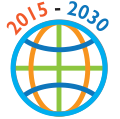 Pacific \ 2030 agenda for sustainable development
Pacific \ 2030 agenda for sustainable development
The global development agenda impacts directly on the work of local government, which is responsible for the delivery of many of the key services that will contribute towards the achievement of global targets. A Global Taskforce, of which CLGF is a member, has worked to ensure greater understanding and recognition of local government’s contribution to meeting global and national development targets. Local government’s engagement with the Agenda 2030 and the new Sustainable Development Goals; efforts to reduce the impacts of climate change; the Addis Ababa Agenda for Action on financing development; Habitat III and the New Urban Agenda, and others is being increasingly recognised. This section provides material on the global development agenda, information on how local government is contributing to global development targets, and information about multilateral and bilateral donor strategies relevant to local government. CLGFs work is informed by global development initiatives which we proactively contribute to on behalf of our members, such as through the Global Taskforce of local and regional governments for post-2015 development agenda towards Habitat III. This includes the 2030 agenda for sustainable development which will guide and inform development priorities over the next 15 years, and Habitat III - the third UN conference on Housing and Sustainable Urban Development in 2016.
Featured
Commonwealth Ministers Reference Book 2017
A Report aimed at fostering sustainable economic, social and environmental development across the Commonwealth, featuring perspectives from some of the world's leading commentators.
Author: Royal Commownealth Society Publisher: Henley Publication year: 2017
UN and SDGs: A Handbook for Youth
"UN and SDGs: A Handbook for Youth" explores SDGs and the 2030 Agenda from a youth perspective. In the first chapter, it introduces the concept of sustainable development and outlines its historical development through the transition from Millennium Development Goals (MDGs) to SDGs. The second chapter discusses how youth can be harnessed as a major agent of change in achieving sustainable development, focusing on several pertinent youth issues in Asia and the Pacific. The final chapter introduces the UN system and its regional arm, ESCAP, explaining their role in the successful implementation of SDGs.
Author: UNESCAP Publisher: UNESCAP Publication year: 2017
Local-level finance: improving the accountability and effectiveness of urban development programmes
This paper aims to inform future policy by providing a critical analysis of grassroots finance models. It argues for more locally centred and driven sustainable development but also considers the limitations: What are the critical challenges of participation, scale and the translation of savings into development resources? By concentrating on activities with a high degree of community leadership, this paper looks at the challenges of shaping localised arrangements to fit with structured development programming.
Author: Wayne Shand Publisher: International Institute for Environment and Development IIED Publication year: 2017
Local democracy as a substitute for data (and rather a good substitute too)
Everyone seems to want data or more data. Data that helps target the 'right' people with the 'right' things. Data on the billions who suffer deprivations as legitimation for the entire aid and development business. Data to measure and monitor the global goals and targets that governments have agreed to (or hopefully will agree to within the proposed Sustainable Development Goals (SDGs). There is also an enthusiasm for mining existing datasets. All this was highlighted by A World That Counts, a report prepared at the request of the UN Secretary General. This suggests that the data revolution can be a revolution for equality.
Author: David Satterthwaite Publisher: IIED Publication year: 2015
Planning for Sustainability in NSW Local Government
Local councils in the state of New South Wales (NSW) in Australia are starting to give serious consideration to how they can include ‘sustainability’ in their planning for the future. There is no statutory requirement to create a sustainability plan – and therefore no standard definition of what constitutes such a plan for local government in NSW. The same is true of the term ‘sustainability’, for which there is no standard or legislative definition. However, the NSW state division of Local Government Managers Australia (LGMA - a professional organization for council managers) has recently released a ‘Sustainability Health Check’ as a resource to assist councils in assessing their current performance and devising appropriate strategies and action plans for sustainability. In addition, several individual councils have used the opportunity provided by the state government’s Urban Sustainability Program to make a first attempt at developing a sustainability plan.
Author: Jade Herriman,Emma Partridge, Mick Paddon Publisher: University of Technology, Sydney Publication year: 2008



